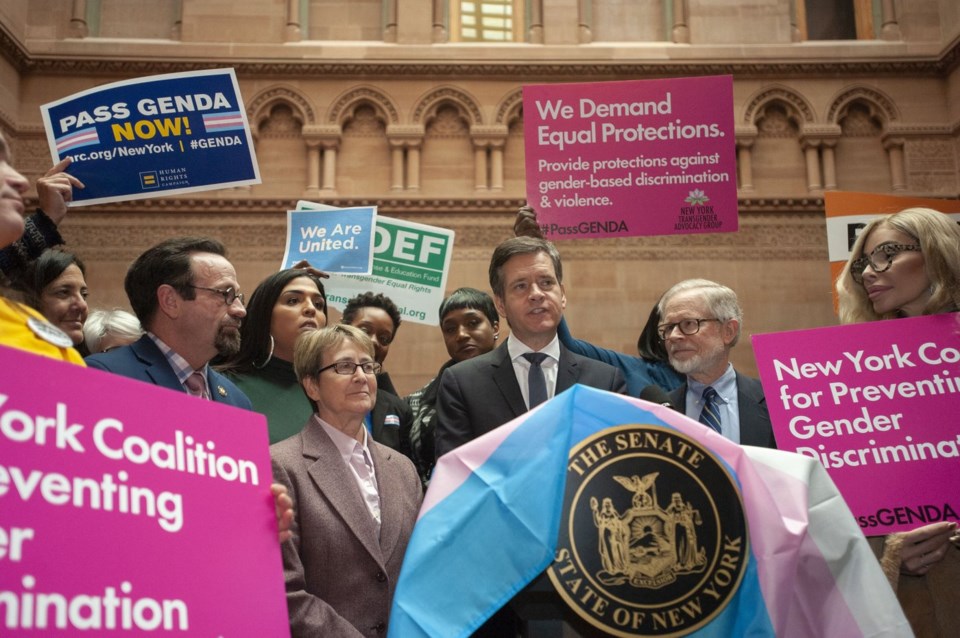ALBANY, N.Y. (AP) тАФ An to New YorkтАЩs constitution that would bar discrimination based on things including тАЬgender identityтАЭ and тАЬpregnancy outcomes" is up for a final vote Tuesday amid debate over how much it might affect future abortion and transgender rights.
Supporters and opponents sharply about the potential legal impact of the Equal Rights Amendment, also known as Proposition 1.
New YorkтАЩs constitution currently forbids discrimination based on race, creed or religion. The amendment would add language that says someone cannot be denied civil rights because of their national origin, age, disability, sexual orientation, gender identity, gender expression, pregnancy, pregnancy outcomes or тАЬreproductive healthcare and autonomy.тАЭ
Democratic leaders put the amendment partly in hopes of boosting turnout by voters passionate about protecting abortion access, in an election year where U.S. House races in New York could help decide which party controls Congress.
Several other states also have abortion-related on their ballots Tuesday. Most of those ballot questions when it should be legal to end a pregnancy. But in New York, state lawmakers took the indirect approach of writing the amendment as an antidiscrimination measure.
Democrats who support the amendment have argued that the new language would create a legal framework where any restrictions on abortion would amount to an unconstitutional form of discrimination in medical care. The New York City Bar Association has agreed with that assessment, as have some other legal experts.
Still, the fact that the amendment itself does not use the word abortion has caused headaches for its supporters. It also opened the door for opponents to claim its other language would lead to a raft of .
Republicans have run a strong messaging campaign against the amendment, choosing not to focus on what protections it might provide for abortion, but to target other parts of the proposal. Their main attack line has been to argue the amendment would provide a constitutional right for transgender athletes to play on girlsтАЩ sports teams.
TheyтАЩve also argued that its language on national origin could result in noncitizens being allowed to vote, that its ban on age discrimination might take away price discounts for senior citizens, and that it could also wind up stopping parents from having a say in their childтАЩs medical care.
Previous state court decisions have found that existing language in the state constitution bars noncitizens from voting. And the New York City Bar Association says the amendment would not block existing state laws requiring parental consent for a childтАЩs medical care.
Legal battles are already underway in New York over whether existing state and federal laws give transgender people the right to play on sports teams that match the gender identity.
Democrats in the state legislature voted to put the amendment on the 2024 ballot after the U.S. Supreme Court overturned Roe v. Wade. Voters elsewhere have shown support for abortion access in previous elections. An poll recently found that 7 in 10 Americans think abortion should be legal in all or most cases.
Uncertainty over the New York amendmentтАЩs impact on abortion was pronounced enough, however, that it caused even the state Board of Elections to throw up its hands. The board is responsible for writing simple explanations of proposed amendments that voters will see on their ballots. But rather than interpret the measure or include the word abortion in its description, the board decided to reiterate the amendmentтАЩs language verbatim.
Supporters of the amendment objected and filed lawsuit, but the judge in the case, David A. Weinstein, eventually declined to make the board rewrite its description, in part because he could not say for certain how courts would interpret the amendmentтАЩs language.
Abortion is currently legal in New York up through 24 weeks from the beginning of pregnancy. After that, it is only legal if the pregnant personтАЩs life, physical health or mental health is at risk, or if a medical provider determines the fetus is not viable. Although there is no defined time frame, is a term used by health care providers to describe whether a pregnancy is expected to continue developing normally or whether a fetus might survive outside the uterus.
Democrats have firm control of state government in New York, making any new abortion restrictions unlikely in the near future.
Backers of the proposal argue that if the amendment passes it would create a strong layer of abortion protections in New York that would be difficult for a future legislature to repeal. That's because New York requires the legislature to pass an amendment to the constitution two times before it goes to voters for final approval.
Anthony Izaguirre, The Associated Press


